Understanding the Heavy Burden of Parental Burnout
Parenting is inherently demanding, but when stress becomes chronic and overwhelming, it results in parental burnout—a complex condition impacting mental health, family dynamics, and overall well-being. Recognizing the signs early and implementing effective coping strategies are essential for maintaining a healthy balance amidst the chaos of modern parenthood.
Recognizing the Signs and Symptoms of Parental Burnout
What are the signs and symptoms of parental burnout?
Parental burnout presents with a variety of physical, emotional, and behavioral signs that can often be mistaken for general stress or fatigue. Physically, parents might notice chronic tiredness, persistent headaches, muscle aches, sleep disturbances, and a general sense of low energy. These symptoms are often coupled with emotional challenges, such as feelings of emotional detachment from children, irritability, mood swings, and feelings of hopelessness or depression.
Emotionally, burnt-out parents frequently experience increased frustration, impatience, guilt, and a diminished sense of efficacy as a parent. They may feel overwhelmed by their responsibilities, leading to withdrawal from social interactions and neglect of personal needs. Burnout can also cause parents to feel disconnected, going through the motions of caregiving without feeling joy or fulfillment.
Behaviorally, signs include social withdrawal, increased irritability, neglect of self-care routines, and reduced confidence in parenting abilities. These behaviors can strain relationships within the family, further exacerbating the burnout cycle.
Recognizing these early signs is vital. If caught early, parents can seek appropriate support and practice strategies such as self-care, boundary setting, and seeking help from mental health professionals. Addressing parental burnout promptly helps restore emotional balance, physical health, and improves the overall quality of family life.
Understanding these symptoms and their impact ensures parents are better equipped to seek help and implement coping mechanisms before burnout worsens.
Unraveling the Causes of Parental Burnout
What causes parental burnout?
Parental burnout stems mainly from ongoing stressors and the relentless emotional demands of caring for children. This condition arises when parents experience sustained exhaustion from juggling multiple responsibilities, leading to feelings of depersonalization, emotional drain, and diminished satisfaction in their parenting role.
One of the primary contributors is chronic stress due to balancing work commitments with family needs. When parents are unable to find a healthy work-life balance—often because of inflexible job schedules or high work demands—their mental and physical reserves become depleted.
Lack of social support and community resources further intensify the risk. Parents without a robust support network might feel isolated, making it harder to cope with daily stresses. During times of crisis, such as the COVID-19 pandemic, this isolation has been even more profound, escalating burnout levels.
High internal expectations also play a significant role. Many parents strive for perfection in their parenting, setting unrealistic standards for themselves. When they inevitably fall short, feelings of guilt, inadequacy, and frustration can take hold.
External factors are equally impactful. Caring for children with special needs or those experiencing mental health challenges adds layers of stress, requiring additional patience, skills, and emotional work. These circumstances can deepen exhaustion and feelings of helplessness.
Systemic issues like societal pressures, gender roles, and cultural norms can contribute as well. For example, societal expectations can influence parents’ perceived responsibilities, often without adequate institutional support, creating a burdensome mental load.
Furthermore, personal background factors such as a parent’s temperament, early childhood experiences, and pre-existing mental health conditions like anxiety or depression can increase susceptibility. Parents dealing with these internal vulnerabilities may find it harder to manage the stress of parenting.
In summary, parental burnout results from a complex interplay of long-term stress, high personal standards, external pressures, and systemic challenges. Recognized as an issue that can escalate, especially during crises like a pandemic, understanding its causes is vital for prevention and effective intervention.
The Far-Reaching Impact on Mental Health and Family Life
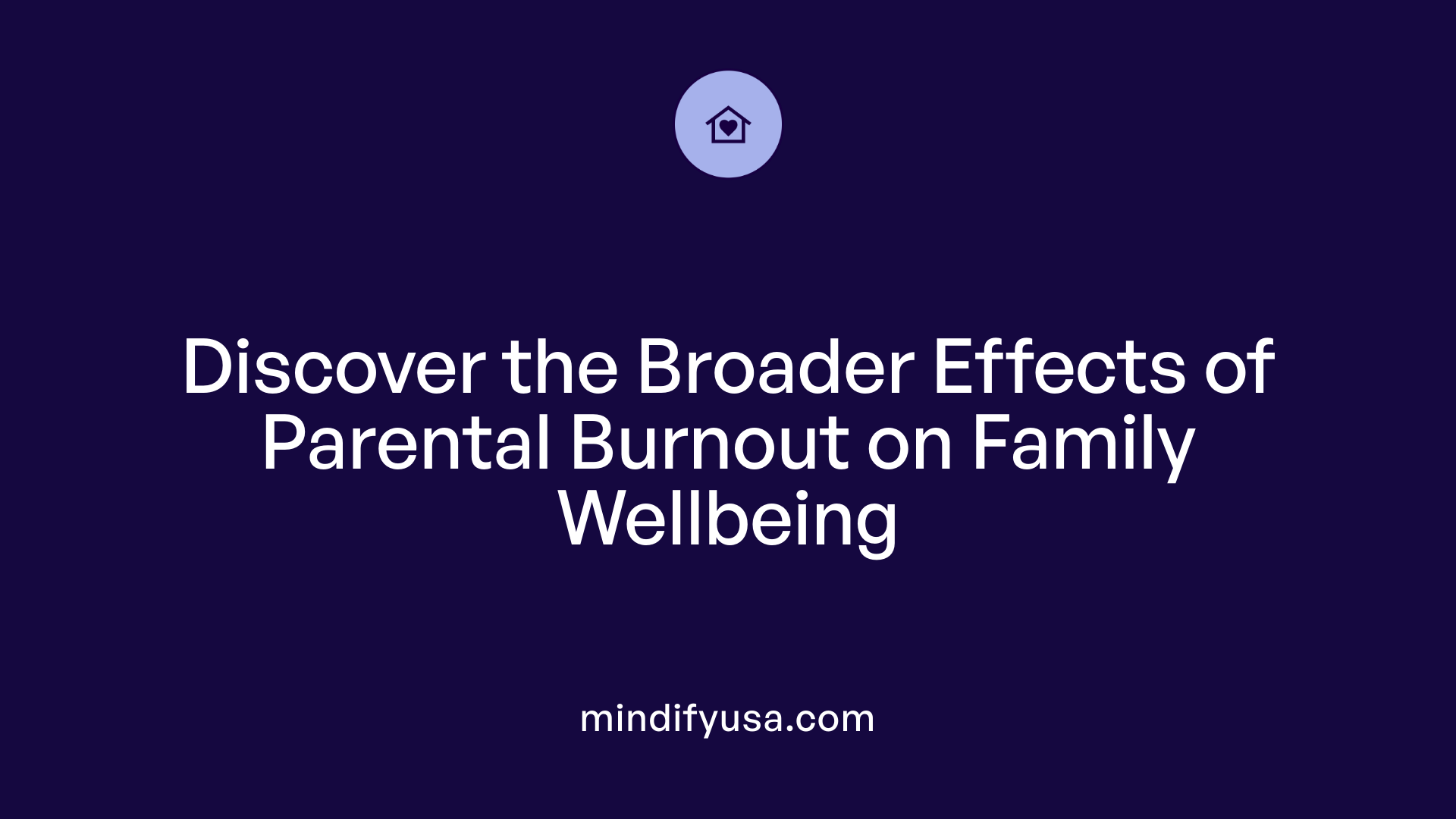
How does parental burnout impact mental health and family well-being?
Parental burnout has profound effects on both mental health and the overall functioning of a family. The condition deeply elevates the risk of developing anxiety, depression, and suicidal thoughts. Parents experiencing intense exhaustion, emotional detachment, and feelings of ineffectiveness often grapple with severe mental health challenges, which may include mood swings, hopelessness, and thoughts of escape. These mental health issues not only affect the parents but also ripple outward to disrupt family harmony.
Concurrently, burnout diminishes a parent's responsiveness and emotional availability. When overwhelmed, parents may withdraw from their children, communicate less effectively, or become irritable and less engaged, which hampers emotional bonding. This detachment can lead to a loss of the nurturing environment children need and increases behavioral problems, emotional insecurity, and attachment issues.
Certain groups are particularly vulnerable. Parents of children with special needs or those from marginalized communities face systemic stressors such as lack of adequate support, societal stigma, and financial hardship, which intensify burnout. Single parents, especially those managing work and household alone, are at increased risk due to the compounded responsibilities.
The COVID-19 pandemic has further exacerbated these issues by adding layers of stress, such as health fears, disrupted routines, and social isolation. High stress levels reported among parents during pregnancy and early childhood stages highlight how external pressures can threaten mental health and family stability.
Addressing these risks requires comprehensive approaches, including enhanced social support, targeted mental health interventions, and family-friendly policies. Such measures can help reduce parental stress, restore emotional connections, and foster healthier family environments, ultimately safeguarding the well-being of both parents and children.
Strategic Approaches to Managing Parental Burnout
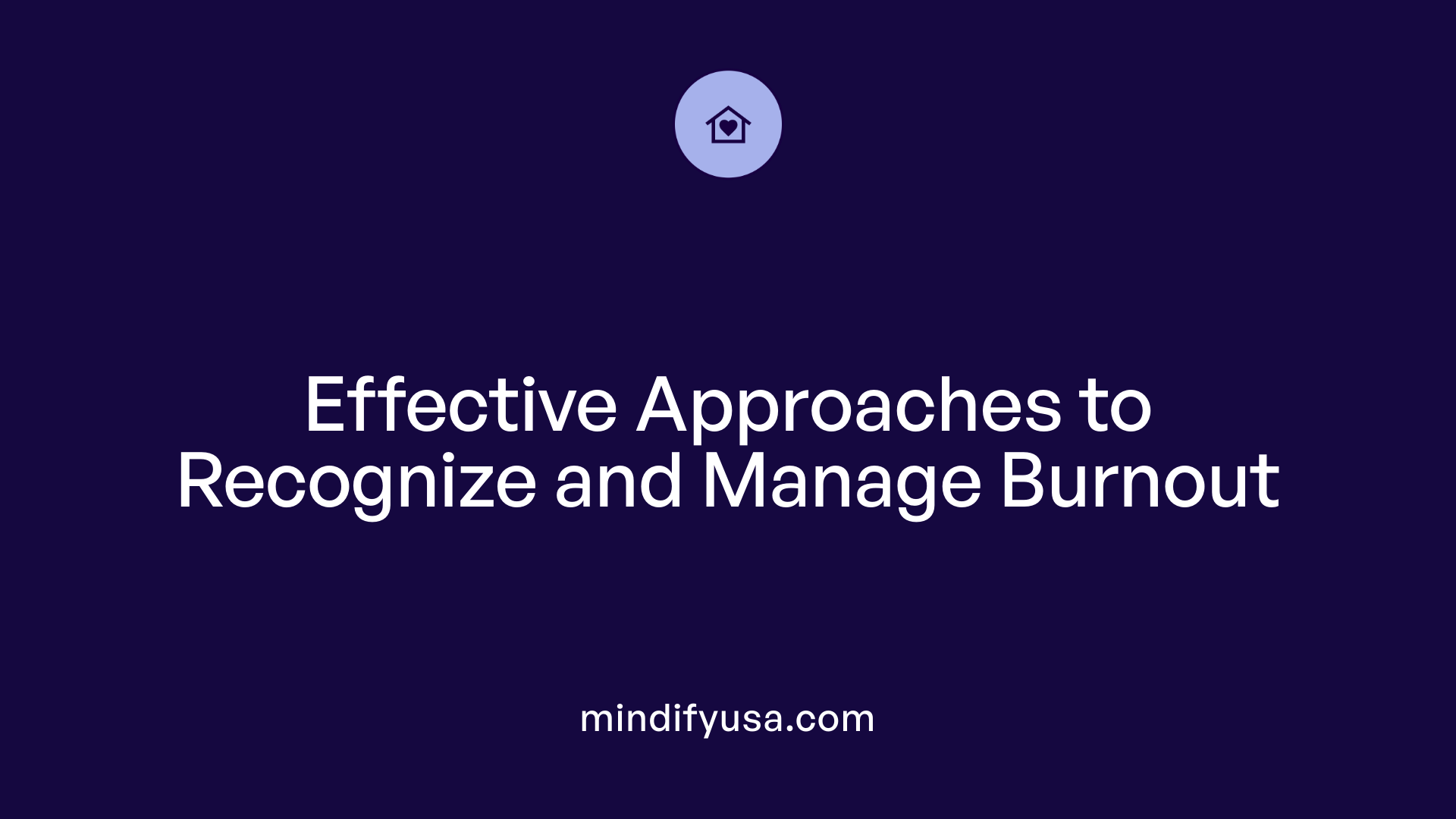 Parental burnout is a complex condition characterized by physical, emotional, and mental exhaustion resulting from prolonged stressors linked to caregiving. Recognizing early symptoms such as irritability, fatigue, emotional withdrawal, and sleep disturbances is essential for timely intervention. Self-awareness plays a vital role; parents should monitor their emotional and physical states to detect signs of burnout before they escalate.
Parental burnout is a complex condition characterized by physical, emotional, and mental exhaustion resulting from prolonged stressors linked to caregiving. Recognizing early symptoms such as irritability, fatigue, emotional withdrawal, and sleep disturbances is essential for timely intervention. Self-awareness plays a vital role; parents should monitor their emotional and physical states to detect signs of burnout before they escalate.
Implementing practical coping strategies can significantly reduce burnout symptoms. Prioritizing self-care activities like ensuring adequate rest, maintaining a balanced diet, staying hydrated, and engaging in hobbies helps replenish emotional reserves. For many parents, taking even brief moments for themselves—such as a short walk or relaxation exercise—can make a noticeable difference.
Reframing expectations is another important step. Many parents struggle with perfectionism, feeling they should do everything flawlessly. Letting go of this ideal and embracing imperfections can alleviate guilt and feelings of inadequacy, fostering a more compassionate approach to parenting.
Building a support network is also critical. Sharing feelings openly with friends, family, or support groups creates a sense of community and reduces feelings of isolation. Social connections provide emotional validation and practical advice, helping parents feel less alone in their struggles.
Relaxation techniques such as mindfulness, physical activity, or sensory engagement through stretching, yoga, or deep breathing can help reduce cortisol levels and promote relaxation. These practices can be incorporated into daily routines to manage stress actively.
Finally, seeking professional mental health support is advised if burnout signs persist or intensify. Healthcare providers can offer targeted interventions through therapy or counseling, addressing underlying mental health issues such as anxiety or depression. Overall, a combination of self-awareness, redefining expectations, social support, relaxation, and professional help forms an effective approach to managing parental burnout and restoring well-being.
Assessment Tools for Detecting Parental Burnout
Are there assessment tools or screening methods for parental burnout?
Yes, several validated tools are available to identify and measure parental burnout. The most comprehensive is the Parental Burnout Assessment (PBA), a 23-item questionnaire designed for research and clinical applications.
This assessment evaluates four critical dimensions of burnout:
| Dimension | Description | Example Items |
|---|---|---|
| Emotional Exhaustion | Feeling drained and overwhelmed by parenting demands | "I feel emotionally exhausted from parenting" |
| Depersonalization | Developing a detached attitude towards children | "I feel emotionally distant from my child" |
| Feelings of Being Fed Up | Resentment and frustration with parenting roles | "I am fed up with parenting" |
| Contrast with the Previous Parental Self | Perception of a decline in parental identity | "I no longer recognize my role as a parent" |
For quick screening, the Brief Parental Burnout Scale (BPBs) consists of only 5 items, making it practical for busy clinical settings or initial assessments. It includes questions that tap into emotional exhaustion and depersonalization, with established cutoff scores indicating at-risk levels.
Additionally, the 10-item Working Parent Burnout Scale has been specifically developed for employed parents. It focuses on burnout symptoms related to balancing work and family responsibilities. This scale is useful for identifying severity and guiding interventions tailored to working parents.
Research across different countries and cultural contexts shows that these tools maintain reliability and validity, supporting their use in diverse populations. Their standardized nature allows practitioners to detect early signs of burnout, monitor changes over time, and evaluate the effectiveness of coping strategies.
In sum, these assessment instruments are vital for clinicians, researchers, and parents to effectively recognize and address parental burnout before it leads to more serious health or relational issues.
Practical Tips and Resources for Prevention and Intervention
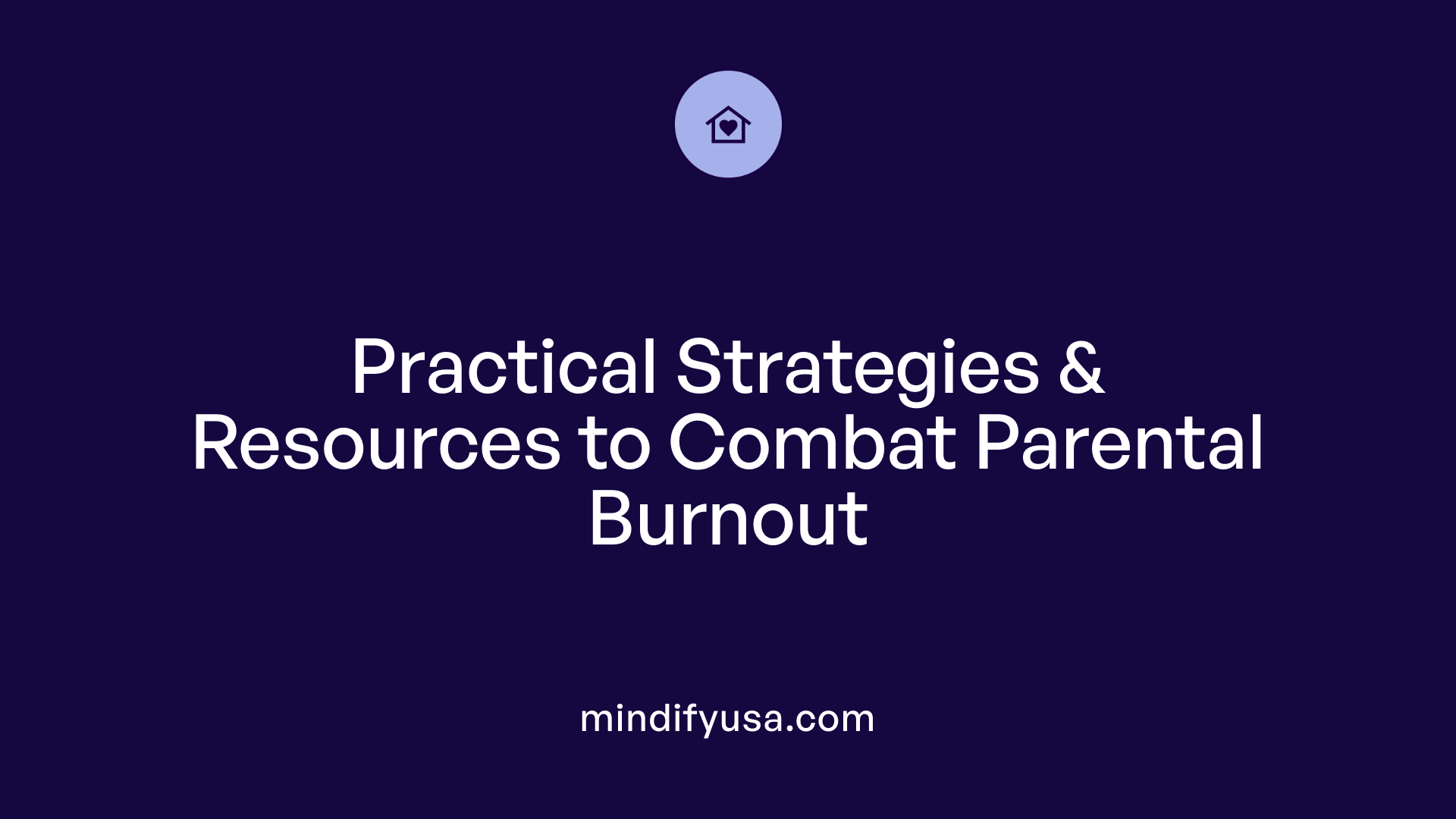
What are some practical tips and resources for preventing or addressing parental burnout?
Parents can take several active steps to prevent or lessen burnout. Engaging in consistent self-care routines is essential. This includes setting aside time for activities that promote relaxation, such as practicing mindfulness, deep breathing exercises, or sensory modulation techniques to reduce stress levels.
Creating adaptable routines and setting realistic expectations also plays a vital role. By establishing manageable daily schedules and embracing flexibility in parenting, parents can lessen feelings of being overwhelmed. Recognizing that perfection is unattainable helps set achievable goals and reduces self-imposed pressure.
Building and utilizing support networks—including family members, friends, community services, and healthcare providers—can provide emotional relief and practical assistance. Sharing feelings openly with trusted individuals helps normalize common struggles and fosters social support, which is crucial during challenging times.
Accessing tools such as burnout assessment scales, like the Parental Burnout Assessment (PBA), can help identify levels of stress and burnout. Crisis helplines such as the 988 Lifeline offer immediate support for urgent needs. Participating in parenting programs offered by organizations like Healthy Families Massachusetts provides guidance and educational resources.
Re-evaluating parenting expectations and establishing healthy boundaries can prevent excessive guilt or responsibility overload. Developing small, manageable stress-reduction techniques—like microbreaks—during stressful moments enables quick mental resets.
Finally, reconnecting with personal values and long-term goals helps parents find renewed purpose and joy in their roles. Moving from merely surviving to thriving involves regular reflection on what truly matters, fostering resilience, and seeking professional mental health support when necessary.
The Significance of Mental Health Awareness in Parental Burnout
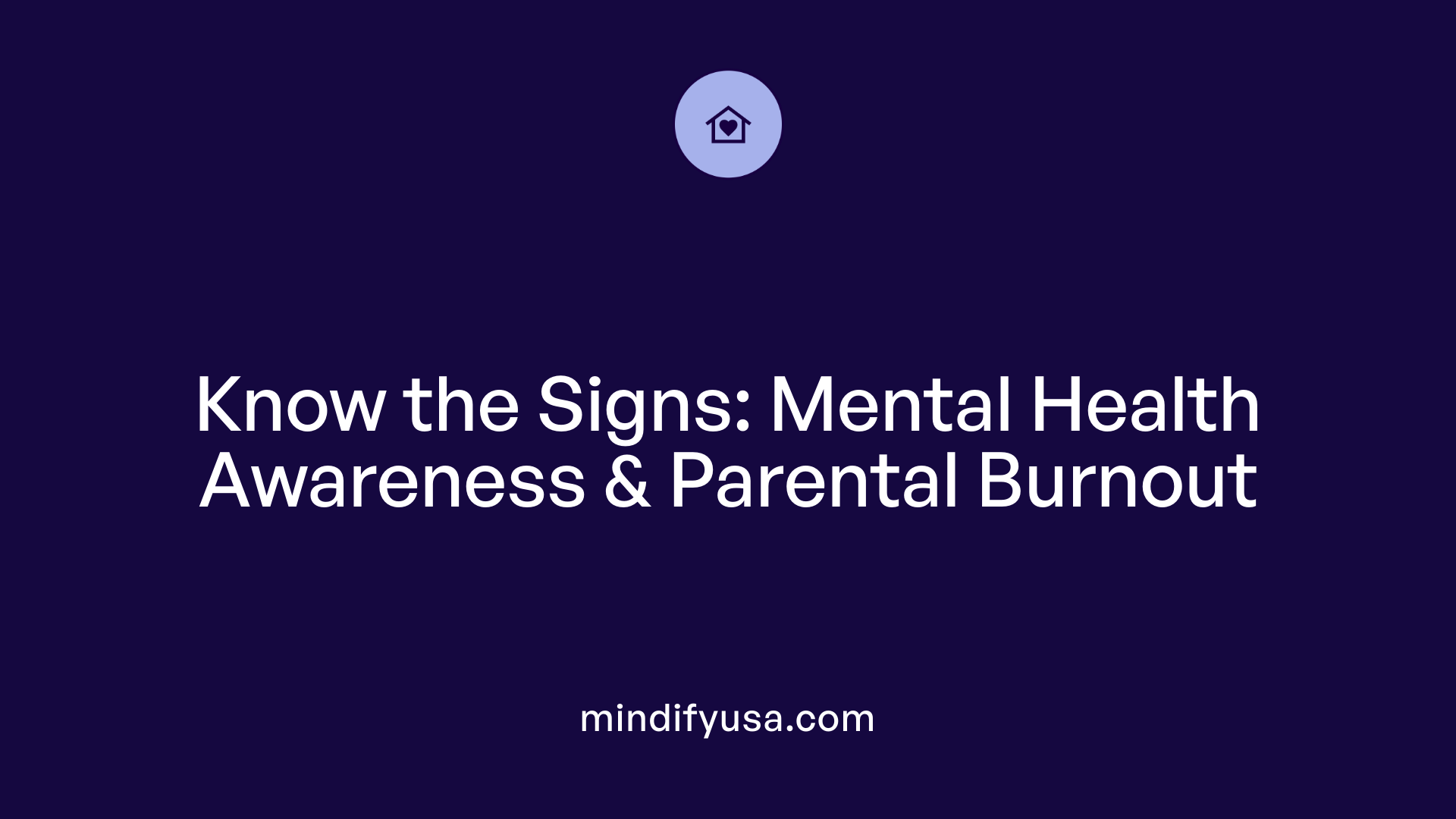
Why is mental health awareness important in dealing with parental burnout?
Mental health awareness plays a vital role in managing parental burnout effectively. Recognizing early signs of mental health issues such as chronic stress, depression, and anxiety allows parents to take proactive steps before burnout becomes severe. These symptoms are often linked to feelings of exhaustion, detachment from children, irritability, and physical ailments like headaches and fatigue.
When parents understand these warning signs, they can seek appropriate help, such as counseling or support groups, which research has shown to significantly reduce burnout risk. Early intervention not only alleviates the immediate symptoms but also prevents more serious consequences, including emotional neglect or potential child maltreatment.
Breaking the stigma surrounding mental health is equally critical. Many parents hesitate to seek help due to fear of judgment or societal expectations. Public awareness campaigns and mental health education foster a supportive environment where seeking help is normalized and encouraged.
Furthermore, mental health awareness emphasizes the importance of supporting both parents and children. Early identification of mental health challenges facilitates timely treatment for children with emotional or behavioral issues, such as anxiety or ADHD. Addressing these concerns early helps foster resilience, improves family dynamics, and reduces long-term negative outcomes.
Overall, fostering a culture of openness and knowledge about mental health not only aids in parental well-being but also improves the quality of care in the family unit. When parents are equipped with information and resources, they are better prepared to navigate the stresses of parenting with confidence and resilience.
Impact on Parenting Behaviors and Child Development
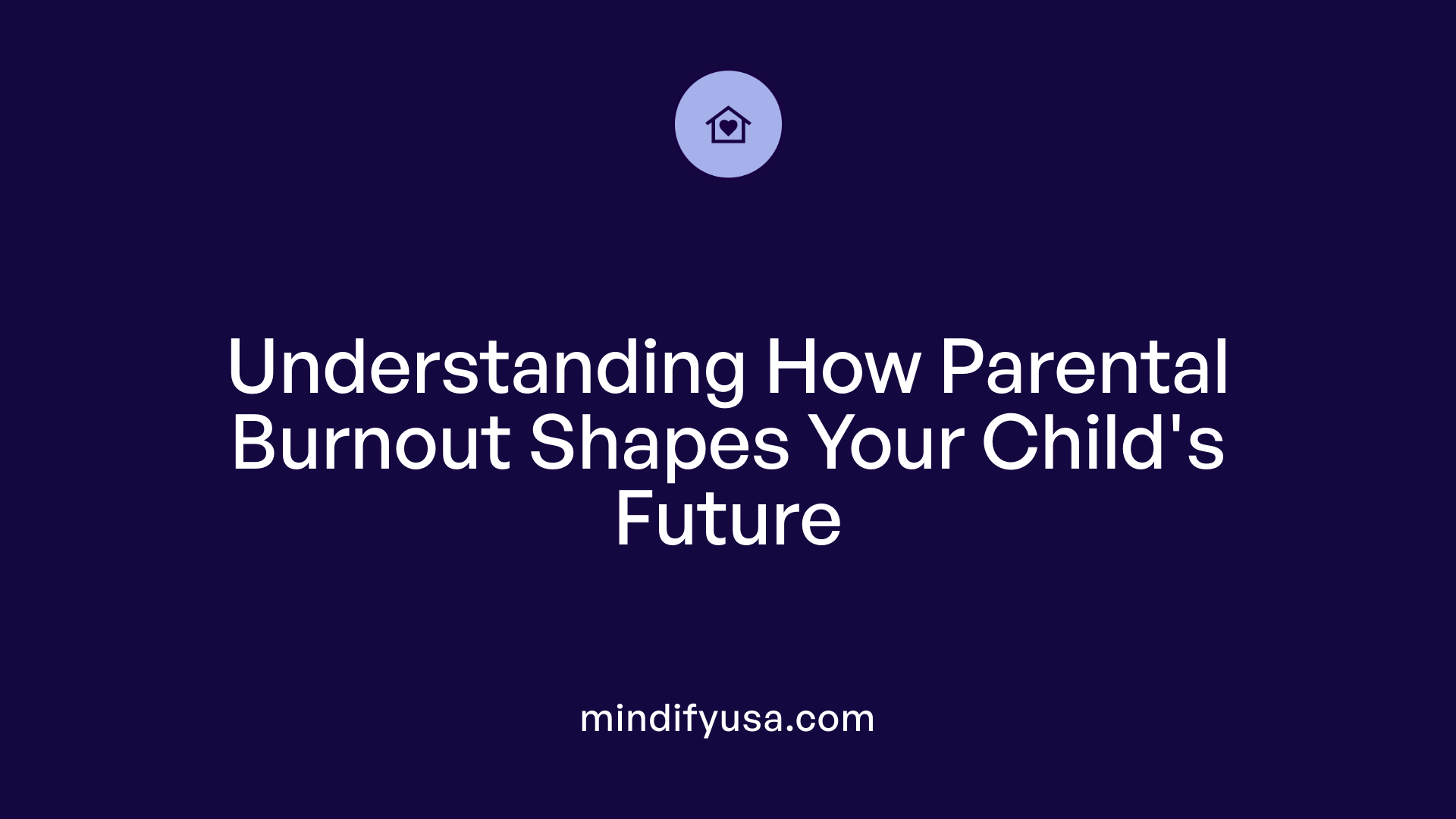
How does parental burnout affect parenting behaviors and child development?
Parental burnout can profoundly alter how parents interact with their children. When parents experience overwhelming exhaustion and emotional fatigue, they are more likely to display increased irritability and emotional distance. This diminishes their sensitivity and responsiveness to their children’s needs, which are essential for healthy emotional bonding.
Increased irritability may lead parents to react more harshly or criticize their children more often. Emotional distancing might manifest as neglecting quality time, ignoring cues, or avoiding physical affection. These changes can reduce the warmth and security children need to thrive.
There are serious risks associated with these altered behaviors. Burned-out parents may become less capable of providing consistent, nurturing care, creating a higher chance of neglect or even maltreatment. Children in such environments are at an increased risk of developing mental health issues, including anxiety, depression, and behavioral problems like aggression or defiance.
Research indicates that parental burnout compromises the attachment process, which is fundamental for children’s social and emotional development. Without supportive and responsive parenting, children might struggle with emotional regulation, social skills, and may develop insecure attachment patterns.
Furthermore, children of parents suffering from burnout often face an increased likelihood of experiencing anxiety and behavioral challenges. These children may internalize stress and exhibit symptoms such as restlessness or withdrawal.
Addressing parental burnout by encouraging self-care, seeking support, and fostering healthier coping strategies is crucial. When parents take steps to manage their stress, their ability to maintain responsive and nurturing relationships improves, supporting healthier development for their children.
In summary, parental burnout not only affects the well-being of parents but also has significant implications for children’s emotional health and overall development. Creating awareness and providing resources for parents are vital in preventing these adverse outcomes and promoting a nurturing environment conducive to healthy growth.
Guidelines for When Parents Should Seek Professional Help
When should parents seek professional help for parental burnout?
Parents experiencing burnout are encouraged to seek professional support when their symptoms become severe or begin to significantly interfere with their ability to care for their children. Persistent feelings of hopelessness, suicidal thoughts, or an inability to meet daily responsibilities are clear indicators that immediate help is needed.
Warning signs such as chronic irritability, emotional detachment from children, sleep disturbances, physical complaints like headaches or exhaustion, and a loss of satisfaction or confidence in parenting are critical signals.
If these symptoms do not improve despite implementing self-care strategies, or if they are accompanied by mental health issues such as anxiety or depression, professional intervention is essential.
Early help can prevent escalation of burnout and related health complications. Therapists and healthcare providers can offer tailored support, diagnose underlying conditions, and help develop coping mechanisms.
When burnout affects safety — for example, when a parent’s mental state risks neglect or inadvertent harm to the child — seeking help becomes urgent. Addressing parental burnout promptly not only restores well-being but also ensures a safer and healthier environment for children.
In summary, parents should reach out for professional help when burnout symptoms are persistent, interfere with family functioning, or threaten safety. Recognizing these signs early and acting can make a crucial difference in restoring balance and resilience.
Practical Methods for Stress Relief and Building Resilience
What are some effective methods for working parents to relieve stress and burnout?
Working parents often face the challenge of balancing demanding responsibilities at work and home. To manage stress effectively, adopting practical self-care strategies is essential.
One of the most accessible methods is engaging in physical activity, such as walking, yoga, or aerobic exercises. Regular movement can boost mood, reduce anxiety, and improve sleep quality. Complementing this, mindfulness practices like deep breathing exercises or meditation help center thoughts, calm nerves, and promote emotional resilience.
Establishing clear boundaries is critical. Parents can create specific work hours, designate a space for work at home, and stick to these routines. This separation helps prevent work from encroaching on family time and reduces feelings of overwhelm.
Building a strong support network is also vital. This may include family members, friends, co-parenting partners, or support groups. Sharing experiences and seeking advice can provide emotional relief and practical help.
Seeking therapy or counseling offers professional guidance tailored to individual needs, helping parents develop coping skills and address underlying stressors.
Lastly, reconnecting with personal values and nurturing hobbies fosters a sense of fulfillment outside parenting roles. Engaging in activities such as reading, gardening, or creative arts allows parents to recharge and maintain their identity, which is crucial for long-term resilience.
Implementing these strategies collectively can significantly reduce stress, prevent burnout, and strengthen a parent's ability to handle daily challenges.
| Strategy | Method | Details |
|---|---|---|
| Physical Activity | Exercise and movement | Improves mood and physical health |
| Mindfulness & Relaxation | Deep breathing, meditation | Promotes mental clarity and emotional calm |
| Boundaries & routines | Setting work and family time boundaries | Minimizes overlap, reduces stress |
| Support Networks | Family, friends, groups | Provides emotional support and practical assistance |
| Professional Support | Therapy, counseling | Offers tailored strategies and emotional relief |
| Personal Hobbies | Reading, crafts, outdoor activities | Reconnects with personal identity and joy |
Creating a balanced approach by integrating these methods can enhance parental resilience and overall well-being, enabling parents to navigate daily stresses with greater ease.
Empowering Parents to Thrive Beyond Burnout
Understanding and addressing parental burnout requires a multifaceted approach that combines awareness, self-care, social support, and professional intervention. Parents must recognize early signs, challenge unrealistic expectations, and foster open communication within families and workplaces. By adopting practical coping strategies, leveraging assessment tools, and accessing available resources, working parents can rebuild their resilience, renew their joy in parenting, and foster healthier family environments. Promoting mental health awareness and systemic support not only benefits individual parents but also ensures the well-being and development of children, creating a more compassionate and understanding community for all.
References
- Healthy Coping Strategies to Reduce Burnout In Stressed Out Parents
- Parental burnout | COPE
- Burnout and Mental Health in Working Parents: Risk Factors and ...
- The impact of parental burnout - American Psychological Association
- Feeling burned out? Strategies to help parents prioritize their mental ...
- Six Ways to Deal With Parental Burnout
- Parental Burnout: Mental Wellbeing of Parents at Work - Onebright
- Parents, how do you know if you're struggling with burnout? - NPR
- What Is Parental Burnout? A Guide for Overwhelmed Parents
- [PDF] Check Yourself for Working Parent Burnout






































































































